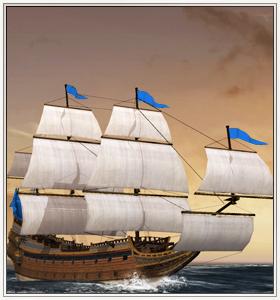Difference between revisions of "Fluyt (ETW Unit)"
CoconutFred (talk | contribs) m (faction) |
Tango12345 (talk | contribs) m (Removed category "Empire Total War Units"; Quick-adding category "ETW Units" (using HotCat)) |
||
| (9 intermediate revisions by 4 users not shown) | |||
| Line 1: | Line 1: | ||
| − | {{Unit|image=[[Image:fl1.jpg]]|Class=Fluyt| | + | {{TW Unit|image=[[Image:fl1.jpg]] |
| + | |Class=Fluyt | ||
| + | |Unit Size=142 men | ||
| + | |Weaponry=41 guns | ||
| + | |Region=Global | ||
| + | |Recruitment Cost=1510 | ||
| + | |Upkeep Cost=240 | ||
| + | |Building Requirements=Dockyard | ||
| + | |Tech Requirements=None | ||
| + | |Attributes= | ||
| + | }} | ||
| + | |||
| + | [[Image:Fluyt.png]]A Fluyt is a design for a square-rigged armed merchantman that is faster and handier than a galleon. | ||
==Overview== | ==Overview== | ||
| + | |||
The ship is a good sailer, as befits a design coming from a seafaring nation like Holland. | The ship is a good sailer, as befits a design coming from a seafaring nation like Holland. | ||
Historically, the fluyt was originated by Dutch shipbuilders, and the type helped the Dutch to become a maritime trading nation in the 17th Century. Extensively used by the Dutch trading companies, it was soon adopted by other nations. The vessels were easy for a relatively small crew to handle, and could carry around a dozen cannon for self-defence, although these were sometimes left ashore so that even more cargo could be carried. | Historically, the fluyt was originated by Dutch shipbuilders, and the type helped the Dutch to become a maritime trading nation in the 17th Century. Extensively used by the Dutch trading companies, it was soon adopted by other nations. The vessels were easy for a relatively small crew to handle, and could carry around a dozen cannon for self-defence, although these were sometimes left ashore so that even more cargo could be carried. | ||
| − | The fluyt had a distinctive “fat-bottomed” cross section. This was a cunning scheme to avoid taxes and tolls, as the Danish had a habit of charging tolls based on deck area for access to the straits between Denmark, Norway and Sweden. A small deck (the big cargo hold below counted for nothing) meant lower taxes! The Dutch had to pay these tolls if they wanted access to any of the lucrative Baltic trade. | + | The fluyt had a distinctive “fat-bottomed” cross section. This was a cunning scheme to avoid taxes and tolls, as the Danish had a habit of charging tolls based on deck area for access to the straits between Denmark, Norway and Sweden. A small deck (the big cargo hold below counted for nothing) meant lower taxes! The Dutch had to pay these tolls if they wanted access to any of the lucrative Baltic trade. |
| + | ==Details== | ||
| − | + | Fluyts are like slightly smaller, faster, and handier version of the Spanish galleon. Available only to the Dutch, fluyts are an advantageous asset when in comes to trade in the trade theatres, as they can actually defend themselves quite well if the need arises, unlike other factions' indiamen or dhows. | |
| − | Fluyts are like | ||
| Line 16: | Line 29: | ||
*[[Image:Dutch_flag.jpg|25px]] [[United Provinces (ETW Faction) |United Provinces]] | *[[Image:Dutch_flag.jpg|25px]] [[United Provinces (ETW Faction) |United Provinces]] | ||
| − | + | [[Category:ETW Ships]] | |
| + | [[Category:ETW Units]] | ||
Latest revision as of 09:47, 30 May 2017
 A Fluyt is a design for a square-rigged armed merchantman that is faster and handier than a galleon.
A Fluyt is a design for a square-rigged armed merchantman that is faster and handier than a galleon.
Overview
The ship is a good sailer, as befits a design coming from a seafaring nation like Holland.
Historically, the fluyt was originated by Dutch shipbuilders, and the type helped the Dutch to become a maritime trading nation in the 17th Century. Extensively used by the Dutch trading companies, it was soon adopted by other nations. The vessels were easy for a relatively small crew to handle, and could carry around a dozen cannon for self-defence, although these were sometimes left ashore so that even more cargo could be carried.
The fluyt had a distinctive “fat-bottomed” cross section. This was a cunning scheme to avoid taxes and tolls, as the Danish had a habit of charging tolls based on deck area for access to the straits between Denmark, Norway and Sweden. A small deck (the big cargo hold below counted for nothing) meant lower taxes! The Dutch had to pay these tolls if they wanted access to any of the lucrative Baltic trade.
Details
Fluyts are like slightly smaller, faster, and handier version of the Spanish galleon. Available only to the Dutch, fluyts are an advantageous asset when in comes to trade in the trade theatres, as they can actually defend themselves quite well if the need arises, unlike other factions' indiamen or dhows.
